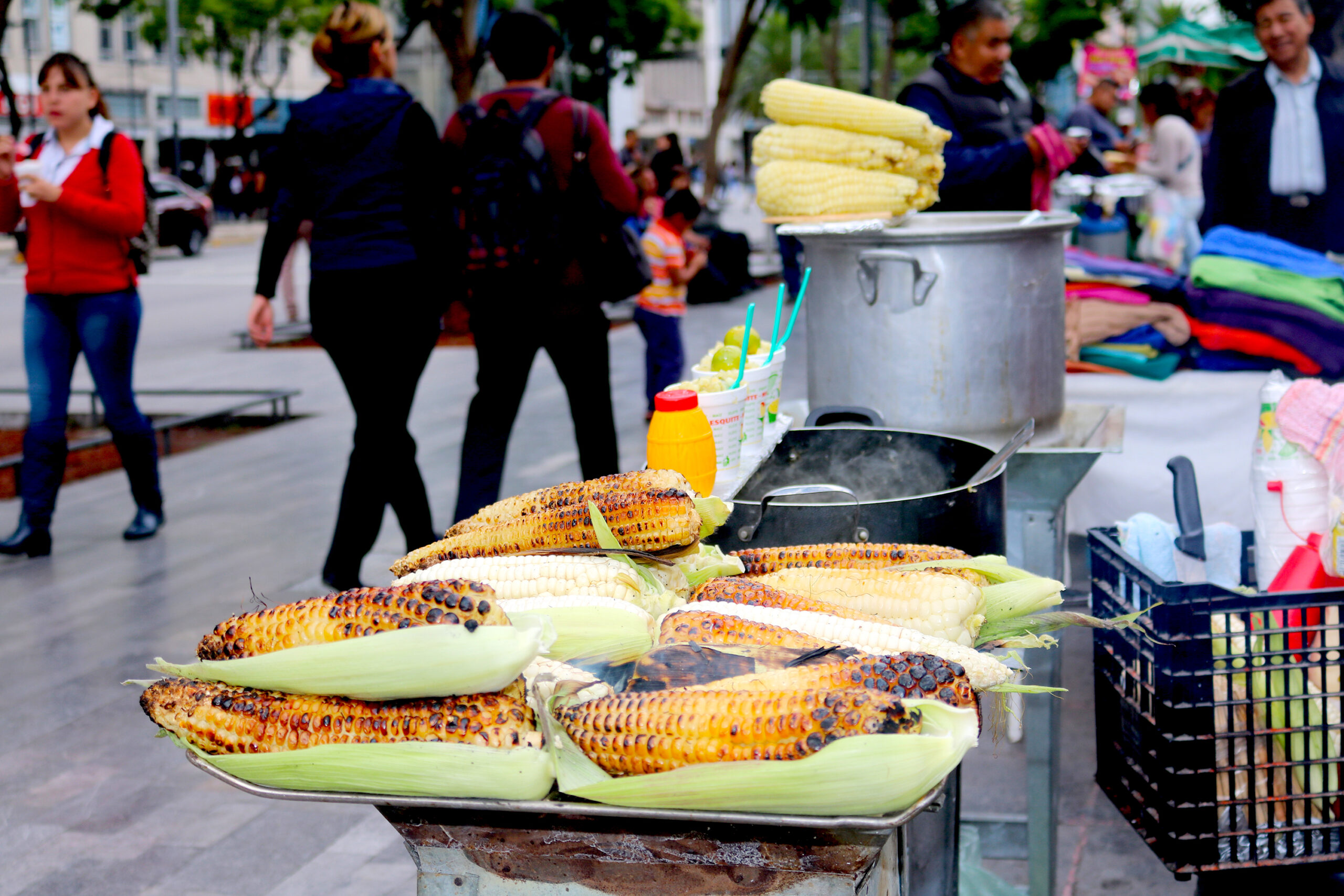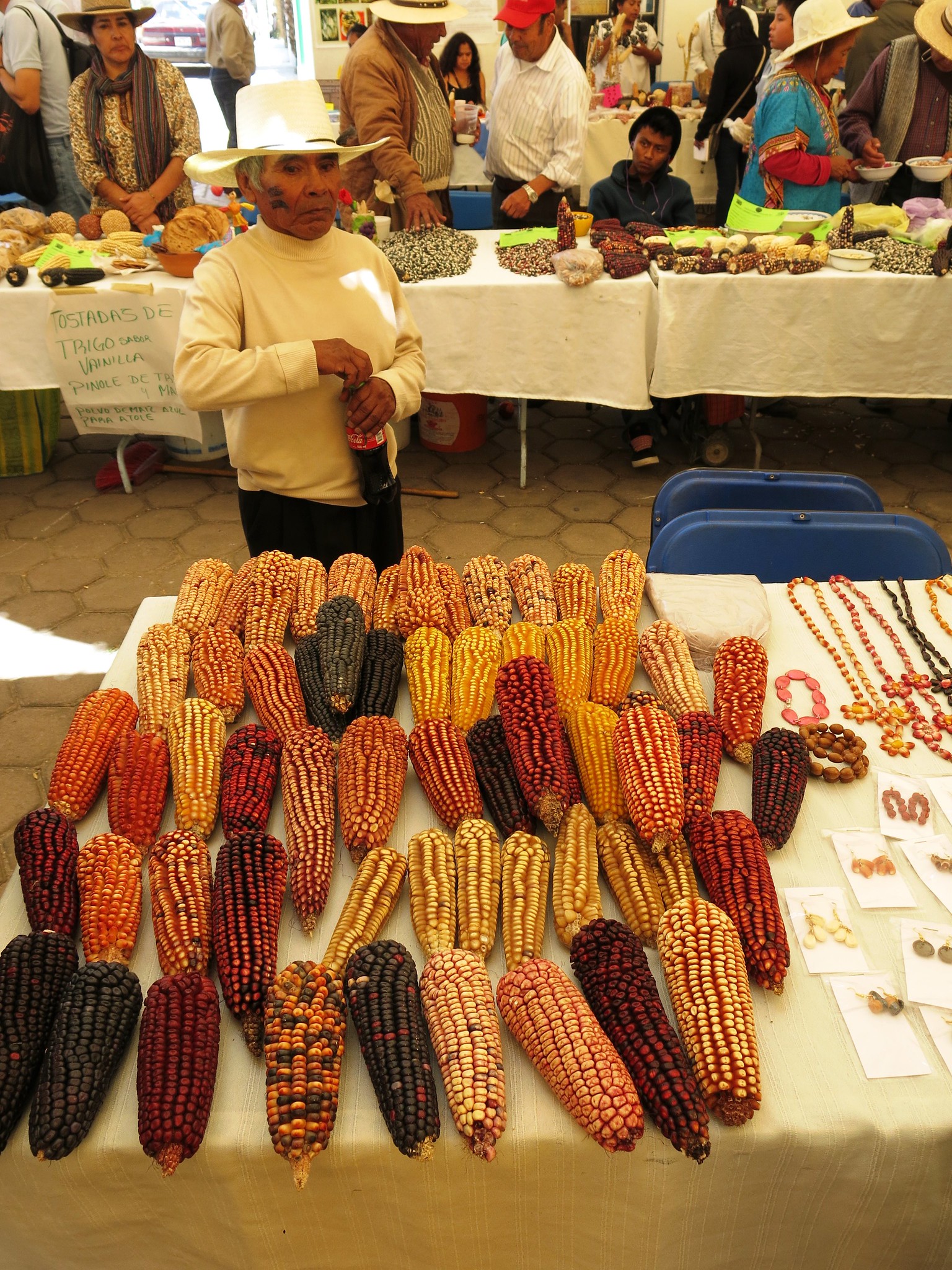Timothy A. Wise says the dispute over GM corn in Mexico may test the extent to which a trade agreement can be used against a country’s public health and environmental efforts.

Roasted corn in Mexico City, 2017. (Blossom Ozurumba, CC BY-SA 4.0, Wikimedia Commons)
By Timothy A. Wise
Inter Press Service
 The U.S. government has escalated its conflict with Mexico over that country’s restrictions on genetically modified corn, initiating the formal dispute-resolution process under the U.S.-Mexico-Canada Agreement.
The U.S. government has escalated its conflict with Mexico over that country’s restrictions on genetically modified corn, initiating the formal dispute-resolution process under the U.S.-Mexico-Canada Agreement.
It is only the latest in a decades-long U.S. assault on Mexico’s food sovereignty using the blunt instrument of a trade agreement that has inundated Mexico with cheap corn, wheat, and other staples, undermining Mexico’s ability to produce its own food.
With the government of Andrés Manuel López Obrador showing no signs of backing down, the conflict may well test the extent to which a major exporter can use a trade agreement to force a sovereign nation to abandon measures it deems necessary to protect public health and the environment.
The measures in question are those contained in the Mexican president’s decree, announced in late 2020 and updated in February 2023, to ban the cultivation of genetically modified corn, phase out the use of the herbicide glyphosate by 2024 and prohibit the use of genetically modified corn in tortillas and corn flour.
The stated goals were to protect public health and the environment, particularly the rich biodiversity of native corn that can be compromised by uncontrolled pollination from GM corn plants.
[Related: US Facing Mexico’s Ban on GM-Corn Imports]
Where the original decree vowed to phase out all uses of GM corn, the updated decree withdrew restrictions on GM corn in animal feed and industrial products, pending further scientific study of impacts on human health and the environment.
Some 96 percent of U.S. corn exports to Mexico, nearly all of it GM corn, fall in that category. It is unclear how much of the remaining exports, mostly white corn, are destined for Mexico’s tortilla/corn flour industries.
These were significant concessions. After all, there is no trade restriction on GM corn. Mexico is not even restricting GM white corn imports, just their use in tortillas.
No matter. In the U.S. government’s formal notification on June 2 that it would initiate consultations preliminary to presenting the dispute to a U.S.-Mexico-Canada Agreement arbitration panel, it cites a lack of scientific justification for the measures, denials of some authorizations for new GM products and Mexico’s stated intention to gradually replace GM corn for all uses with non-GM varieties.

Maize diversity in Tlaxcala, Mexico, 2014. (Thomas Lumpkin/CIMMYT, CC BY-NC-SA 2.0)
As Mexico’s Economy Ministry noted in its short response, Mexico will show that its current measures have little impact on U.S. exporters, because Mexico is self-sufficient in white and native corn.
Any future substitution of non-GM corn will not involve trade restrictions but will come from Mexico’s investments in reducing import dependence by promoting increased domestic production of corn and other key staples.
The statement also noted that the U.S.-Mexico-Canada Agreement’s environment chapter obligates countries to protect biodiversity, and for Mexico, where corn was first domesticated and the diet and culture are so defined by it, corn biodiversity is a top priority.
As for the assertion that Mexico’s concerns about GM corn and glyphosate are not based on science, the U.S. Trade Representative Office’s action came on the heels of an unprecedented five weeks of public forums convened by Mexico’s national science agencies to assess the risks and dangers.
More than 50 Mexican and international experts presented evidence that justifies the precautionary measures taken by the government. (I summarized some of the evidence in an earlier article.)
Three Decades of U.S. Agricultural Dumping
Those measures spring from deep concern about the deterioration of Mexicans’ diets and public health as the country has gradually adopted what some have called “the neoliberal diet.”
Mexico has displaced the United States as the world leader in childhood obesity as diets rich in native corn and other traditional foods have been replaced by ultra-processed foods and beverages high in sugar, salt, and fats.
Researchers found that since the North American Free Trade Agreement (NAFTA) was enacted in 1994, the United States has been “exporting obesity.”
The López Obrador government recently stood up to the powerful food and beverage industry to mandate stark warning labels on foods high in those unhealthy ingredients. Its restrictions on GM corn and glyphosate flow from the same commitment to public health.

Mexican President Andrés Manuel López Obrador in Mexico City, December 2021. (Gobierno de México, CC BY-SA 4.0, Wikimedia Commons)
So does the government’s campaign to reduce import-dependence in key food crops – corn, wheat, rice, beans, and dairy. But as I document in a new IATP policy report, “Swimming Against the Tide,” cheap U.S. exports continue to undermine such efforts.
We documented that in 17 of the 28 years since NAFTA took effect, the United States has exported corn, wheat, rice, and other staple crops at prices below what it cost to produce them.
That is an unfair trade practice known as agricultural dumping, and it springs from chronic overproduction of such products in that country’s heavily industrialized agriculture.
Just when NAFTA eliminated many of the policy measures Mexico could use to limit such imports, U.S. overproduction hit a crescendo, the result of its own deregulation of agricultural markets.
Corn exports to Mexico jumped more than 400 percent by 2006, with those exports priced at 19 percent below what it cost to produce them. Again, from 2014 to 2020, corn prices were 10 percent below production costs, just as Mexico began seeking to stimulate domestic production.
We calculated that Mexico’s corn farmers lost $3.8 billion in those seven years from depressed prices for their crops. Wheat farmers lost $2.1 billion from U.S. exports priced 27 percent below production costs.

The U.S. Trade Representative’s Office in the Winder Building in Washington. (AgnosticPreachersKid, CC BY-SA 3.0, Wikimedia Commons)
Thus far, the Mexican government has had little success increasing domestic production of its priority foods, though higher international prices in 2021 and 2022 provided a needed stimulus for farmers.
So too have creative government initiatives, including an innovative public procurement scheme just as the large white corn harvest comes in across northern Mexico.
With corn and wheat prices falling some 20 percent in recent weeks, the government is buying up about 40 percent of the harvest from small and medium-scale farmers at higher prices with the goal of giving larger producers the bargaining power to then demand higher prices from the large grain-buyers that dominate the tortilla industry.
With its commitment to public health, the environment, and increased domestic production of basic staples, the Mexican government is indeed swimming against strong neoliberal tides.
Remarkably, it is doing so while still complying with its trade agreement with the United States and Canada.
Before U.S. trade officials further escalate the dispute over GM corn, they should look in the mirror and ask themselves if three decades of agricultural dumping are consistent with the rules of fair international trade. And why Mexico doesn’t have every right to ensure that its tortillas are not tainted with GM corn and glyphosate.
For more on the GM corn controversy, see IATP’s resource page, “Food Sovereignty, Trade, and Mexico’s GMO Corn Policies.”
Timothy A. Wise is senior adviser at the Institute for Agriculture and Trade Policy and a senior research fellow at Tufts University’s Global Development and Environment Institute.
This article is from Inter Press Service.
The views expressed are solely those of the author and may or may not reflect those of Consortium News.
Support CN’s Spring
Fund Drive Today


I lived in Mexico before NAFTA and while the Conasupo was still operating in the country. The Conasupo achieved a stable price level for corn by buying and selling. I am not sure if it was cooperatively or state owned, but it was not an extortionist. As well as setting corn and bean prices, it also sold useful household tools and farm implements.
It died the death of many socialist programs with the advent of neoliberalism.
I am always surprised by the hypocrisy of the west, organizations like UN, WB, IMF etc, western nations, how they support cultural preservation and protection and yet they trash those essential principles of sustainable human development when it comes down to money. Cultural diversity is extremely important for human development and richness, but it seems that in western culture primarily, our brain it is incapable to appreciate such diversity when it challenge our beliefs (superior ideology), when it diverges from our principles, when it snobs our “suggestions” that are more hidden imposition. Our behavior is narcissistic, and we all know how dangerous is a narcissist: aggressive when criticized or contradicted, using threats and bullying to coerce others, manipulate and lying extensively, etc. does this remind you of a particular culture?
The intolerance of cultural diversity is embedded in our western culture, but recently we have managed to make it less visible, hidden behind “for humanity purpose” just like the church misused the poor Christ; for decades we have used economics as a tool to homogenize cultures, to resemble our own, the mcdonalization of the world, the globalization, the standardization of economic practices, etc are tools (directly or indirectly) aimed at destroying cultural diversity, at the same time reducing transactional costs and investment risks.
Before was by religion imposition, often followed by brute force, then by military force under racial superiority, today by ideological superiority and economic policies, and again followed by brute force, sanctions, etc.
How many “fabricated studies” have you heard about how wealth is strongly correlated with happiness, how many years the UN’s absurd happiness ranking had shown that the happiest countries are mostly the western rich countries, the same countries whose wealth has come mostly by exploiting for decades if not centuries the poor countries at the bottom of the “great UN’s ranking”.
To me those “studies” has served as propaganda and promotion of a “superior culture”.
It will be a glorious day when UN will be replaced by a “World Council” led by poor and emerging nations.
The economy of a country is what shaped the culture of a country, and viceversa; by changing the economy practice, standardizing its practices, economic behaviors, by imposing western economic and political concepts, by invading a country with western products, the west is engaging in “cultural cancellation and homogenization”; and this is only the tip of the iceberg on how e.g. supranational bodies like the EU has used the economic policy and standardization to “cancel/lessen” cultural diversity in Europe, ask the Italian, how the country as changed since joining the EU and adopting the Euro. Some European politicians genuinely believed that by eliminating cultural differences they would cure discrimination and ultimately war; in fact, the desire to homogenize shows only one thing – a new type of racism/xenophobia – we eliminate cultural diversity so we don’t have to deal with and feel bad about our xenophobic mind, problem solved.
For the GM, there are not enough long-term studies on the effect on our bodies; lets open a window in a not-so-distant future: scientist have discovered that the stomach task is not only to extract nutrients from the foods, but also to extract information, chemical, disease, fungi, bacteria, etc that the natural plant has absorbed, information vital to the body to adjust to the ever changing environment, then what? what we know for sure is that GM are reducing the diversity of plants and animals, sound familiar? GM are the true representation of our culture. Aren’t we something?
You’ve said it all there jamie. There is nothing to add of any consequence. (So long, and thanks for all the fish.)
The more I find out about AMLO ,the more impressed I am .What a leader of his citizens should be and to hell with the profit motive ,health should and is number one priority.Would that we should have such leadership in my country of Canada.
Good for Obrador. Mexico is world central for natural domestic maize varieties–thousands. It is extremely important to keep those strains pure.
I just did a YT video on GM wine yeasts, so I studied it all a bit. Even though now the definition of GMO organisms has changed depending on each country (and the newer technique of shuffling of genes WITHIN an organism)–the old definition is that GMO organisms are transgenic. That means inserting genes from different genera—in contrast to hybridization, which is crossing species. (Someone please correct me here if I get any of this wrong)
What most readers may not realize is that there are different types of maize/corn: Flint, Dent, and Sweet corn.
–Flint corn is what is ground into corn meal, and I’m pretty sure that is the vast majority world wide, including feed corn.
–Dent corn is sweeter/stickier, and used for masa.
–Sweet corn is an extreme minority in production numbers. I don’t think the GMO modifiers have tweeked with sweet corn yet. It is not important enough in volume. That is what most do not understand. I have seen adds for ‘non-gmo sweet corn’ on the street, and is a bit of a misnomer. As far as I know, no sweet corn is GMO. Most of it has merely been hybridized. I admit to being unclear as to the difference between standard hybrids, SE1, and SE2 sweet corn selections.
The image of corn on the street in Mexico City above is of sweet corn. It is not GMO.
One final note: I think most of the animal feed corn in the US is GMO. The dogs and the cats are having a hard time with it.
Mexico needs to stand its ground on this. GMO crops are less healthy due to the high levels of agricultural chemicals in and on them, and every country should be free to decline their use. The US only talks about “free trade” when they actually mean “rigged trade” that is rigged to benefit the US at the expense of other countries. I was excited to hear AMLO declare that he was going to limit GMO imports and emphasize local production with the rich history of native strains of corn that have been cultivated for hundreds or thousands of years in Mexico. If it is really “free trade” then everyone should be free to not buy GMO.
Quite right John. A good book disclosing the lies of governments and industry on the safety of GM foods is “Seeds of Deception” by Jeffrey M. Smith.